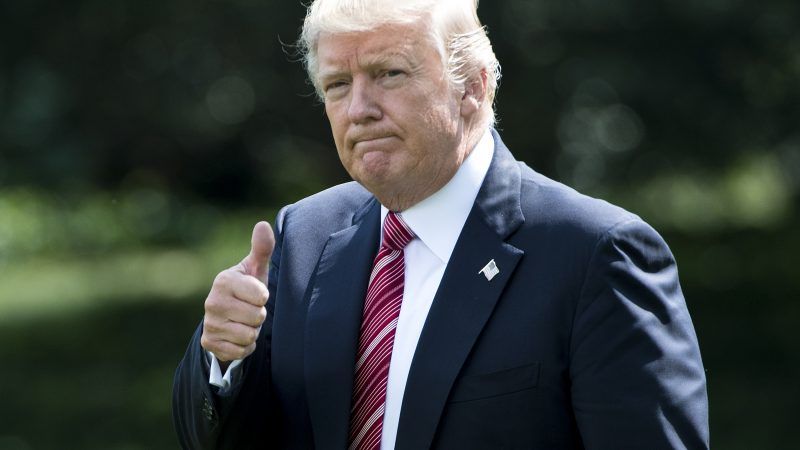Democrats Overwhelmingly Vote to Give Trump's People More Spying Power
Plus: Sondland worked "on Ukraine matters at the express direction of" Trump, why hospital prices are so screwy, D.C. gets pushback for ditching sex work bill, and more...

Don't like being spied on by federal government snoops? Too bad. Mass surveillance of American communications is likely to continue, with the Trump administration calling the shots—and we have both ruling parties to blame for that.
Democrats are "just as responsible for warrantless surveillance as Trump and the GOP," as libertarian-leaning Rep. Justin Amash (I–Mich.) tweeted yesterday.
Nearly every Democratic member of the U.S. House of Representatives voted to fully reauthorize the Patriot Act through March 2020, extending the right of federal agents to use all sorts of secret surveillance against Americans.
That's right: "At the same time that Democrats are holding impeachment inquiries to determine if President Donald Trump abused his executive power, they apparently have no qualms about letting him continue to spy on Americans," as Reason's Eric Boehm wrote yesterday.
Only 10 House Democrats voted against it and three—including 2020 presidential candidate Tulsi Gabbard (Hawaii)—didn't vote, leaving a whopping 219 Democratic representatives who voted in its favor. Meanwhile, just 12 Republicans voted for the measure.
House Democrats who joined Amash in voting no included freshman members (and Trump scapegoats) Alexander Ocasio-Cortez (N.Y.), Ilhan Omar (Minn.), Ayanna Pressley (Mass.), and Rashida Tlaib (Mich.)
Some have defended affirmative votes by pointing out that the Patriot Act reauthorization was tucked into a stopgap spending measure designed to avoid imminent "government shutdown." But there's no reason for the Patriot Act extension to outlast the stopgap spending approval, which only funds things through December 20. In fact, there's no reason for the Patriot Act extension to be tucked into this spending measure at all. Yet House leadership rejected an Amash amendment that would have removed the Patriot Act provision from the spending bill.
The extension "has no business being in there," but "just like GOP leaders, Dem leaders ruled my amendment out of order," complained Amash on Twitter Monday.
In the Senate, both Republicans and Democrats lent a lot of support to the spending measure and its Patriot Act reauthorization.
FOLLOWUP
Yesterday in impeachment proceedings:
And so far this morning:
Amb. Sondland lays it out plainly.
"Secretary Perry, Ambassador Volker and I worked with Mr. Rudy Giuliani on Ukraine matters at the express direction of the President of the United States. We did not want to work with Mr. Giuliani. .. We followed the President's orders."
— Yamiche Alcindor (@Yamiche) November 20, 2019
FREE MINDS
Disruption at D.C. City Council meeting after prostitution decriminalization bill was tabled. Activists from BYP100 and DECRIMNOWDC interrupted a city council committee meeting yesterday to protest the lack of support for sex work decriminalization by Vince Gray, Ward 7's council member.
BREAKING @BYP_100 and @DecrimNowDC just disrupted @vincegrayward7 Health Committee meeting proclaiming that criminalization is unhealthy and demanding he support the decriminalization of sex work. #decrimnowdc pic.twitter.com/GCshLeUX94
— BYP100 (@byp100) November 20, 2019
FREE MARKETS
Why is hospital pricing so screwed up? A podcast discussion between economist Russ Roberts and Keith Smith—founder of the free market oriented Surgery Center of Oklahoma—helps illustrate that. They bring up a hospital that billed a patient more than $101,600 for a surgery, only $13,000 of which was then covered by the insurance company.
Before anyone starts cursing insurance companies: the price charged directly to patients at Smith's center for the same surgery is $10,000. The hospital was billing the insurer way above a reasonable rate. Why? Because it can claim that disparity as a loss and use that to get money from the government:
Keith Smith: So, a $100,000 bill, the hospital collects $13,000. They claim that they lost $87,000. This $87,000 loss maintains the fiction of their not-for-profit status, but it also provides the basis for a kickback the federal government sends to this hospital in the form of what's called Disproportionate Share Hospital payments.
But the insurance companies still share some blame here:
Smith: I mean, why would an insurance company agree to play along with this hospital? Well, the insurance company actually wants an inflated charge because then, for employers they work with, they can show that the savings that dealing with that particular insurance company generates is very, very large…. Now, what the insurers actually do is ask the hospital administrators, "Can you do a brother a favor and actually charge $200,000 for that, so that our percentage savings actually looks larger?"
Listen to the whole podcast here. Read a longer except here.
QUICK HITS
- A reminder that Andrew Yang might be better than a lot of the Democratic 2020 presidential candidates, but he's still full of stupid ideas.
- Democratic Sen. Kamala Harris (Calif.) "rose to prominence through the marble halls of establishment courtrooms; they've now become an anchor dragging her down": Mic offers a postmortem on the Harris presidential campaign.
- A 20-year-old is being charged with providing material support to a terrorist organization for allegedly writing code for ISIS.
- Chicago suburbs are saying no to cannabis shops.
- Sweden is dropping sexual assault charges against WikiLeaks' Julian Assange.
- How sex workers are fighting back against mass surveillance.
- Protecting and serving:
a startling, shocking statement by Philly's police union: they attack the Inquirer for featuring an ad by Malcolm Jenkins, an African American NFL player, and then close their statement with: "What's the Inquirer's next plan, a survey of drug dealers?" pic.twitter.com/XknOySNmiE
— Taniel (@Taniel) November 19, 2019


Show Comments (212)